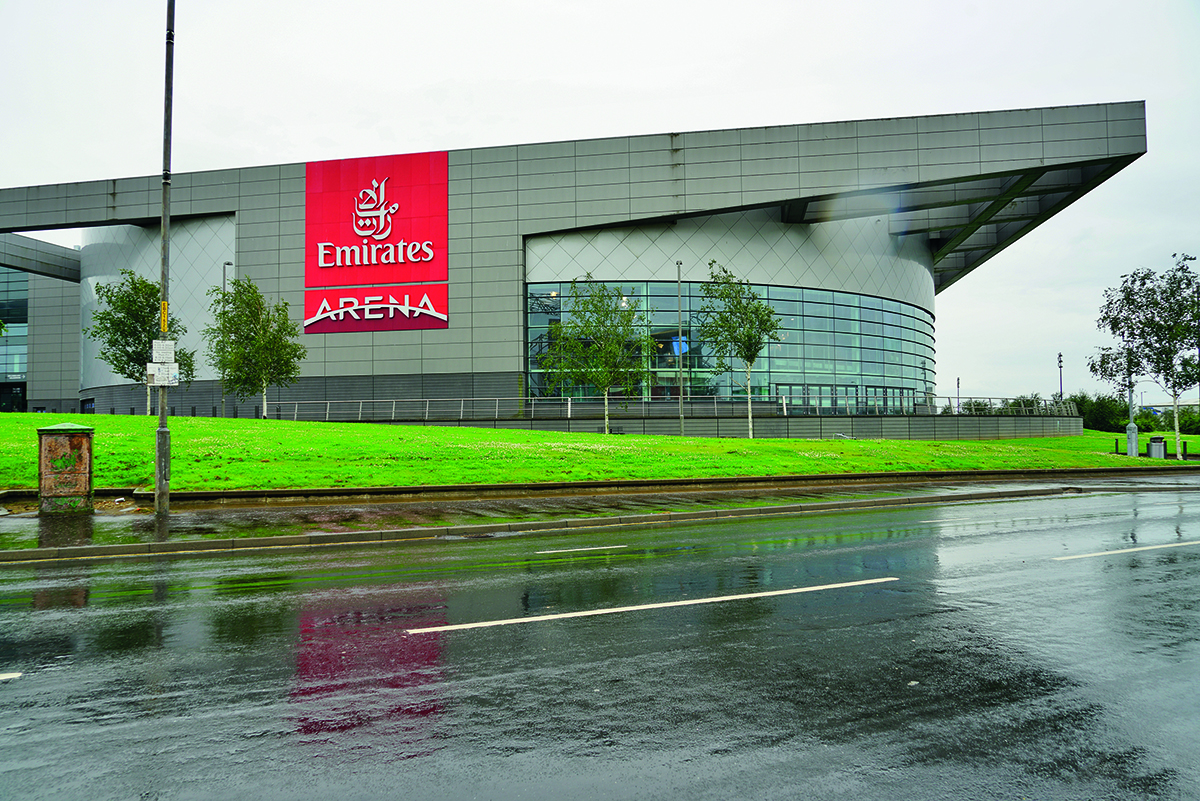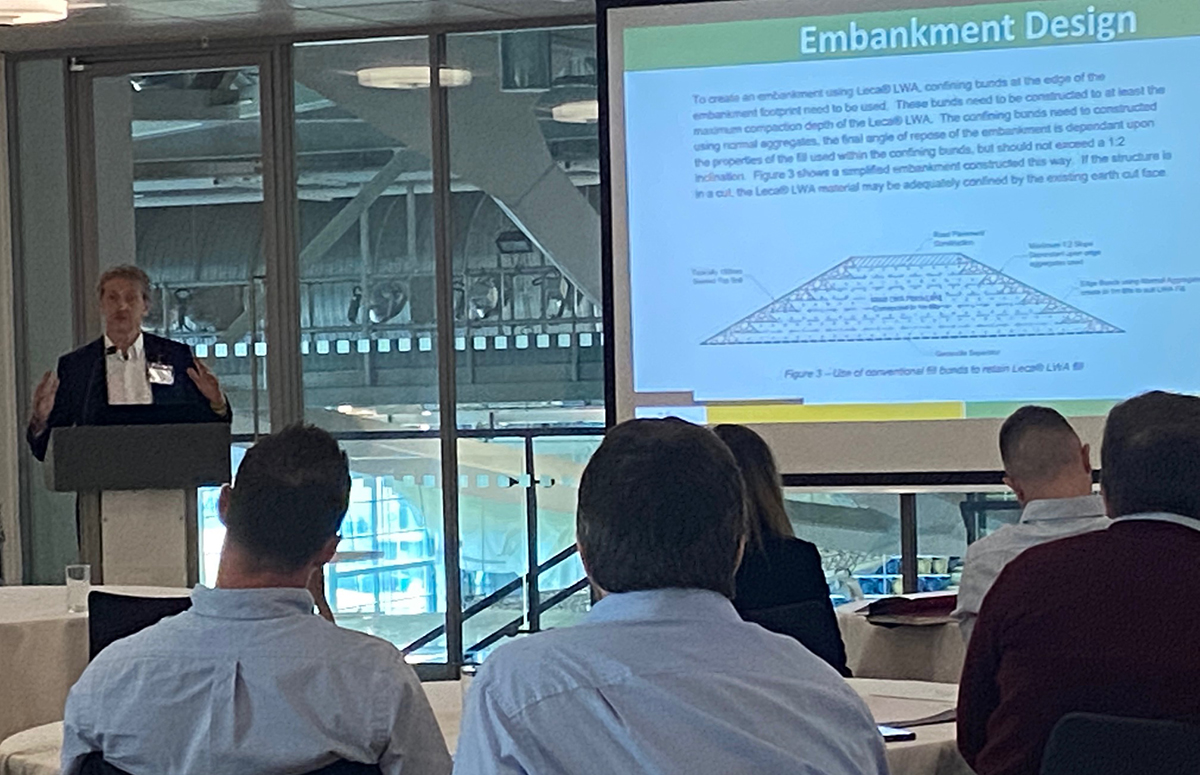
THE impact of an increased focus on environmental matters within the ground engineering sector was highlighted at a recent event in Glasgow.
The impressive Emirates Arena and Sir Chris Hoy Velodrome in the city’s east end provided the setting for Geotex Glasgow 2022. The event featured speakers from eight companies within the sector, who came along to detail recent projects, innovations, and sustainability measures.
The day began with a presentation by Geosynthetics, a firm which specialises in providing ‘inspired solutions’ for civil engineering. That was followed by a talk from wastewater treatment specialist Siltbuster, which explored the latest changes to environmental legislation and demonstrated best practice for the treatment of common construction site pollutants including silts, oils and concrete wash water.
Next up was Platipus Anchors with an insight into how Percussion Driven Earth Anchors (PDEA) can be used for temporary or permanent applications including erosion control, slope stability, earth retaining structures and drainage.
Concrete Canvas then explained how its concrete impregnated fabric that hardens on hydration to form a ‘thin, durable, waterproof and fire-resistant’ concrete layer is being used as an alternative to conventional concrete in a range of applications.
Maccaferri, Leca UK and Anderton Concrete all provided presentations before the event concluded with a talk by Geobrugg, which develops protection systems made of high-tensile steel wire. The firm has been involved in projects around the world including an initiative to mitigate the risk of landslides at Rest and be Thankful on the A83.

Experienced ground engineering specialist Patrick McGowan, MD of Geotex, has been running the seminars across the UK since 2007. Following a two-year hiatus due to the pandemic, Geotex is back and providing a valuable resource for industry professionals to network and find solutions to common challenges.
The biggest change Patrick has noticed since Geotex first launched is the emphasis many of the speakers are putting on sustainability.
He explained, “Ground engineering is a narrow, specialist field. There are only a certain number of businesses involved. However, all of them in the time that I’ve been running Geotex have changed dramatically. The primary driver has been environmental concerns. Today here in Glasgow I’ve watched presentations and seen different case studies driven by sustainability and environmental concerns, whereas 15 years ago that wasn’t the case.
“The ground engineering industry rapidly took on those drivers for change. Long gone are the days when you could excavate half a site and throw it in landfill.
“How do we find ways of re-using this material? How do we find ways of not doing the dig to start with? The environmental and sustainability driver has really accelerated change in the ground engineering industry. At the end of the day, if you’ve got technology that’s not cheaper and faster and more environmentally friendly, it’s not going to be adopted. You’re not going to get any work.”
Patrick added that the case studies highlighted at Geotex bely the reputation that the construction sector sometimes has for being staid, constricted by regulation, and leaving no room for innovation.
He cited that, through talking to one another, many of the companies who attend the seminars now work collaboratively on projects, which is one of the benefits of attending these kind of events.
“The beauty of Geotex is that because speakers are specialised in ground engineering, the delegates choose to come because that’s what they’ve got an interest in,” Patrick said. “There’s a synergy between the speakers and the delegates because often times they arrive with a project in mind that they don’t have a solution for. They’ll come in and see a presentation and either have a chat now and go away with an idea, or it will be something that lodges with them and then in six months’ time they’ll say: ‘I saw a guy in Glasgow that told me how to do that’.
“From the speakers’ point of view, they get to talk to an audience that is interested in them, in what they’ve got to talk about, and their technology and innovations. From the delegates’ point of view, they’re coming along because they’ve probably got a project with an issue, or they’ve had one in the past, and they’ve identified that they need to go and talk to these people. That’s why it works.”
Following the pandemic-enforced break, Patrick is enthusiastic about promoting the importance of live events once more, admitting he’s had ‘mixed reports’ having spoken to both people who can’t wait to get out of the office, but also others who have become used to working from home and aren’t so keen to travel.
“We’re trying to re-build and create a space where those trailblazers who don’t want to do everything on Zoom and Teams can actually come out of the office into the real world and talk to other people,” he explained.
“A recent survey I saw said 73% of people wanted to go to live, in-person events. That’s encouraging. I think people are social animals. We all like to come and hear a story; we all like to look someone in the eye and shake their hand, now that is allowed. That’s always where Geotex has worked well in the past because it’s giving that informal friendly morning – people can relax and talk to experts in this kind of environment.
“I hope that comes back to some sense of normality again sooner rather than later.”








